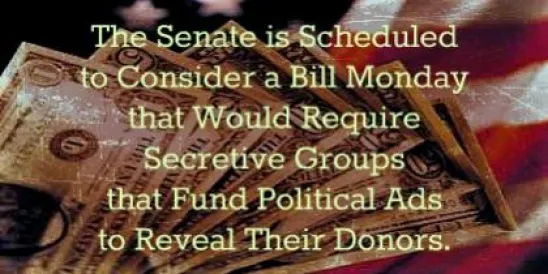Vote set for quixotic bill that would reveal attack ad funders
A bill designed to reveal the donors behind anonymously funded political attack ads is scheduled to hit the floor of the Senate Monday — however, the legislation has virtually no chance of passing, and even if it did pass, it still wouldn’t go into effect until after the 2012 election.
The original DISCLOSE Act — which stands for “Democracy is Strengthened by Casting Light on Spending in Elections” — has been stripped down considerably since it was first introduced in 2010. The newest version is the thinnest yet.
Sen. Sheldon Whitehouse, D-R.I. Gerald Herbert/AP
Re-introduced in March by Sen. Sheldon Whitehouse, D-R.I., the bill is an attempt to shine light on the secret donors behind political advertisements — primarily funded by nonprofit corporations — that have flourished since the U.S. Supreme Court’s 2010 Citizens United decision.
Facing vehement opposition from Republican leaders and groups such as the U.S. Chamber of Commerce, the newest version of the bill was trimmed in an attempt to garner bipartisan support, a Whitehouse staffer said.
Gone is the requirement that the group’s leader endorse the ad on air and that the ad disclaimer list the group’s top funders. And corporations and unions would not be subject to more stringent requirements for reporting political activities to shareholders and members.
And most notably, the new legislation changes the effective date to January 1, 2013 from July 1, 2012.
Meredith McGehee, policy director at the Campaign Legal Center, said it is “tragic” that the new reporting requirements won’t be enacted this election.
The disclaimer provisions “were dropped to make clear that this is completely about disclosure,” said Fred Wertheimer, president of the campaign finance reform group Democracy 21, which supports Whitehouse’s legislation.
“The reason was to get this focused on a very simple question,” he continued. “Are you for public disclosure of information that citizens are entitled to, or are you for secret money in elections?”
The bill has been blocked by Senate Minority Leader Mitch McConnell of Kentucky who has said in the past that the legislation is “nothing less than an effort by the government itself to expose its critics to harassment and intimidation.”
McConnell declined to comment for this story Thursday. A spokesman said that the senator will oppose a “cloture vote” on Monday — a procedural vote that would end debate on the bill and allow it to receive an up-or-down vote on the Senate floor.
The bill would require labor unions, corporations, super PACs and nonprofits to disclose the names of donors who have given $10,000 or more once the organization has spent $10,000 or more on campaign activity.
Politically active nonprofits such as the American Action Network, Crossroads Grassroots Policy Strategies and the American Future Fund have spent millions on advertisements critical of President Barack Obama and congressional Democrats.
Yet, because these groups are organized as 501(c)(4) “social welfare” organizations, they are not required to reveal the names of their donors — unlike super PACs and other political committees that must list all contributors who give more than $200.
At a press conference Thursday in the Capitol, Whitehouse blasted this lack of transparency.
“The names sound harmless, but the ads are too often paid for by special interests,” he said.
For example, in 2010, the prescription drug trade group PhRMA donated $9.4 million to politically active nonprofit groups, including $4.5 million to the American Action Network, as the Center for Public Integrity previously reported. These contributions weren’t revealed until the trade group filed a tax return with the Internal Revenue Service a year after the 2010 midterm election.
Campaign finance reformers have long sought to garner support from potentially sympathetic Republican Sens. Richard Lugar of Indiana, Scott Brown of Massachusetts, Susan Collins and Olympia Snowe of Maine and John McCain of Arizona, who earlier this year warned that the public should expect “huge scandals” in the wake of the Supreme Court’s ruling.
Yet it is unclear if any GOP senators will break ranks with McConnell. Suzanne Bottorff, a spokeswoman for Lugar, said she was unsure of how the senator would vote.
Kevin Kelley, a spokesman for Collins said the senator is “still looking at the specific details of this bill and has not yet said how she might vote.”
Staffers in the press offices of Brown, Snowe and McCain did not immediately respond to requests for comment.
Most campaign finance reform advocates aren’t holding their breath for GOP support.
“I would expect the Republicans are going to march in lockstep,” said Craig Holman, a lobbyist for the consumer rights group Public Citizen.
“The Republicans are going to filibuster,” he continued. “It’s going to lose.”
Even the new reductions haven’t won much love from opponents of the legislation.
David Keating, president of the Center for Competitive Politics said the sponsors dropped all of the “outrageous disclaimer requirements” from the bill but it still has “huge problems.” It covers not only election-related advertising, but genuine issue ads. He said it will “tie up nonprofit groups in red tape if they seek to influence Congress.”
Ultimately, campaign finance reformers want to put legislators on the record — and on notice.
“The bottom line here is every senator has a choice to make,” Wertheimer of Democracy 21 said. “If they vote to continue secrecy, they are going to take responsibility for the corruption and scandals that are bound to follow.”
Alexandra Duszak contributed to this report.




 />i
/>i

